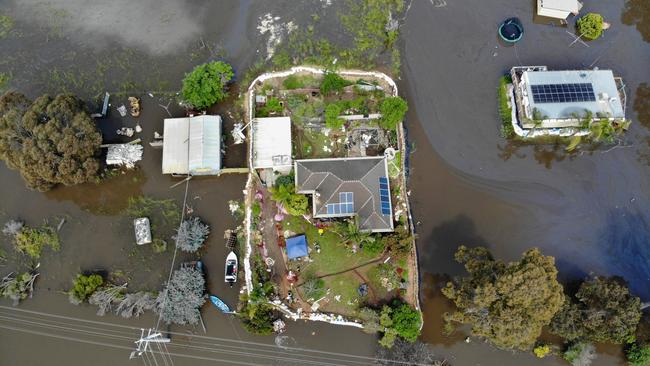Climate project funding is still available since SVB’s collapse, just less of it, says Telstra Ventures
Silicon Valley Bank’s collapse has made financing for companies using ‘unproven’ technology to tackle climate change tougher but Telstra Ventures says there is still cash available.

Tech start-ups will still be able to attract funding but their founders must be prepared to accept haircuts in valuations, particularly those dealing in “blue sky” or unproven technologies to combat climate change, Telstra’s venture capital arm says.
The collapse of Silicon Valley Bank was a shock for the $US32bn ($48bn) venture debt industry, threatening a key source of financing for entrepreneurs whose aim is to reduce carbon emissions.
Unlike many tech companies, climate start-ups often need large amounts of capital to build factories and spend on equipment. SVB provided funding to many, even those which are yet to generate revenue.
Telstra Ventures declined to comment on SVB directly but Albert Bielinko, a partner at the firm, said technology start-ups would still be able to access funding – just not at the heady valuations experienced in the past few years.
“Ultimately, I think the less sure the economics are, the harder it is to fund projects like that today,” Mr Bielinko said.

“So I expect that the current uncertainty will mean that projects that are more pie in the sky and less proven will be harder, which is a shame because we need to be investing in lots of different things in this space.
“It could also just be that there’ll be a willingness to fund those breakthrough technologies, which I think we need for humanity, but the valuations are lower.
“So the founders of those very bold businesses raise the capital they need, but ultimately, they own maybe slightly, maybe a lot less, than their business at the end of the day.”
Telstra Ventures, which has more than $1.3bn in funds under management, raised more than $500m last September to invest in companies aimed at tackling climate change.
The bold projects Mr Bielinko referred to include those which are struggling to operate at scale, such as carbon removal programs and small nuclear reactors.
Even before SVB’s collapse, Telstra Ventures warned that half the number of venture capital firms that have been launched in the past five years would fold as raising capital became tougher and company valuations crumbled
In January, Telstra Ventures managing director Matthew Koertge drew parallels between the dotcom crash of 2000 and the global financial crisis, saying many of the funds which have launched since 2015 would not survive.
“A lot of people have come in, invested really aggressively … threw money around like drunken sailors and now it’s going to be very hard for those firms to raise more capital,” Mr Koertge said at the time.
But the need for climate change-related investments is critical. The Intergovernmental Panel on Climate Change late last month said although humanity had driven the planet to the precipice of climate catastrophe, there was still time to steer global temperatures to within relatively safe limits.

Mr Bielinko is optimistic that entrepreneurs and investors, such as venture capital firms, can work with governments to help limit global warming, saying human ingenuity cannot be underestimated.
“More than 100 years ago, it was widely expected that humanity would run out of food. But ultimately we have been able to get more out of less with ammonium nitrate and some of the other innovations,” he said.
“Farms today can five-times their production per capita and obviously we didn’t run out of food, so I do think there will be breakthrough innovations that will change the game.”
Last December, Telstra Ventures entered the rooftop solar market, leading a $US15m capital raising for renewable energy software firm OpenSolar, to accelerate its green expansion.
The platform allows contractors to design a solar panel installation and provide customers with accurate performance data – including estimated savings from switching to renewable energy.
It has 75 hardware, finance and service providers connected to its platform and makes its money by charging those companies rather than solar panel installers.
“We’re not a gigantic infrastructure fund. We don’t have the capital to invest in extremely capital-intensive businesses like huge installations of wind and solar, but we are looking at software businesses very extensively in this space,” Mr Bielinko said.
“We think that data will be really critical. The huge ramp-up of financing needed in this space will require lots more data than exists today.
“You would be surprised how little data exists in some facets of climate change. And so being able to do the unlock, to either provide the right software or data to make those solutions scale faster and at a much bigger scale, is a really core part of what we’re trying to do.”
The company is investing “actively” in adaptation. This has included leading $US15.5m series A funding in flood insurance company reThought.
“Unfortunately, we think that we’re at a stage where we’re almost certainly going to surpass the 1.5C increase,” Mr Bielinko said.
“And so we’ve invested in a business, for example, called reThought, which is a flood insurance technology company. What it’s doing, it’s pricing flood risk using climate change data for every particular property.
“That enables the market to operate correctly in terms of insurance, adapting to the damage that it will cause to properties in the future and we think a lot of that hasn’t really flowed through to property prices, to kind of the risks inherent in some of these buildings, so we think a play like reThought makes sense and we’re actively looking for a lot more.”
Since its inception 10 years ago, Telstra Ventures has returned more than $800m to its investors, gaining favour from former Telstra CEO Andy Penn, and it expects that number to hit $1bn in the next few years.
Collectively, Telstra Ventures’ 92 investments have resulted in 33 liquidity events – via M7A or IPO – 17 have achieved unicorn status with a valuation above $US1bn, including five achieving decacorns status (above $US10bn).




To join the conversation, please log in. Don't have an account? Register
Join the conversation, you are commenting as Logout